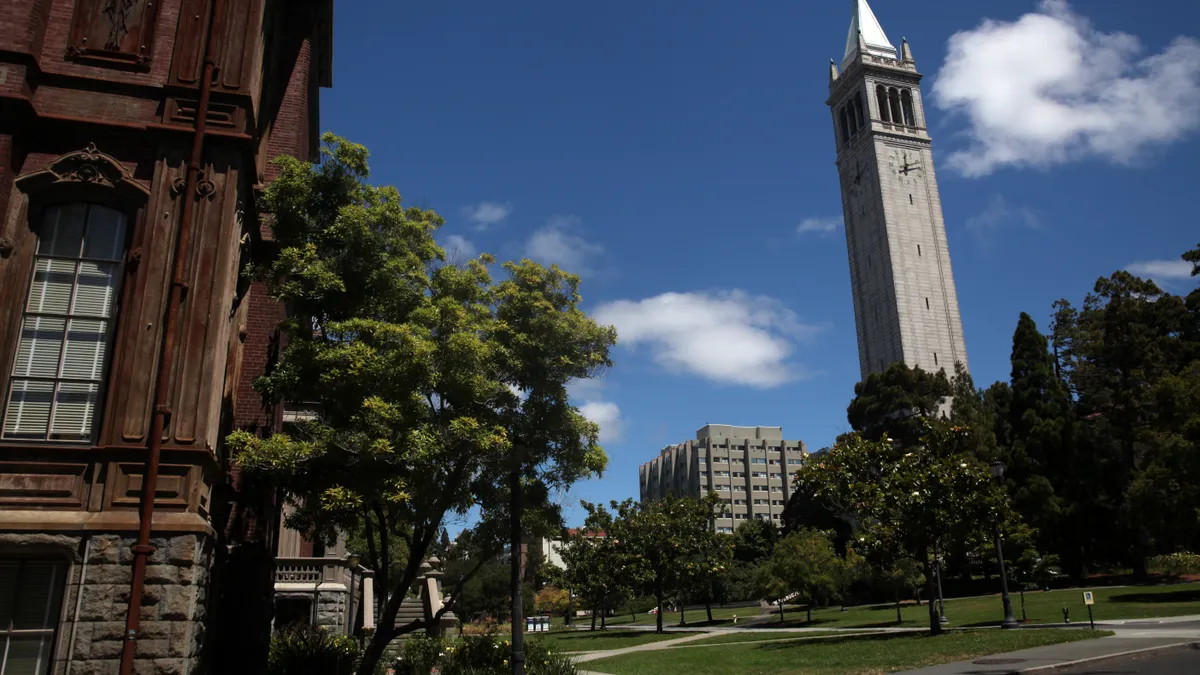Dive Brief:
- The University of California, Berkeley, will need to trim its upcoming fall class by about one-third, or more than 3,000 students, after the state's Supreme Court declined Thursday to lift a cap on its enrollment.
- California's high court kept in place an order last year by Alameda County Superior Court Judge Brad Seligman, which froze UC Berkeley's enrollment at 2020-21 levels until the top-ranked public institution can assess how the growth in students would affect local housing, noise levels and services. Residents of the City of Berkeley had sued the university, arguing it violated a state environmental protection law.
- UC Berkeley officials described Thursday's ruling as "devastating news" and said they will attempt to mitigate the harm to prospective students by boosting online enrollment and asking incoming students to delay attendance until January 2023.
Dive Insight:
The state Supreme Court's decision will severely disrupt UC Berkeley's creation of its fall class. It recently touted the record number of applications it received, with a 13% increase in freshman applications driving a total of more than 128,100 students seeking admission to its first-year class.
Transfer applications dropped by 13%, to about 19,300 applicants. UC Berkeley admitted 15.6% of undergraduate applicants in 2021-22, according to the most recently available data from the institution.
Berkeley enrolled 45,000 students in the fall, including those at graduate and undergraduate levels, up from 42,000 in 2020. The university is due within mere weeks to notify students they were accepted for its upcoming fall class. It will almost certainly have to reduce the number of new first-year and transfer students enrolling from a planned 9,500 to 6,500.
The turmoil stems from a lawsuit filed in 2019 by Save Berkeley’s Neighborhoods, a residents' group, arguing the university had infringed on the California Environmental Quality Act, a state law often cited to oppose new construction.
Seligman sided with the residents' organization in August 2021, ruling that the university should more thoroughly investigate increased enrollment's effects on the surrounding area.
A glimmer of legislative hope for the university, however, may come with a state bill. The proposed legislation would exempt from the stringent environmental review housing for the University of California, California State University and California Community Colleges systems.
A Democratic state lawmaker told CalMatters state legislators are aware of the coming admissions deadlines and that they're "on the case." Students typically commit to a college by May 1.
The university will attempt to work with state leaders on a fix, Chancellor Carol Christ and Provost Catherine Koshland said in a statement Thursday. They said they would prioritize enrolling California residents.
"This ruling is disheartening; however, our resolve is unwavering. We will do whatever we can to mitigate the harm to prospective students and to continue to serve our students," the officials said.
UC Berkeley has said it would forfeit $57 million in revenue from tuition, fees and state support should it be forced to turn away more students. Supreme Court Justice Goodwin Liu referenced this in a dissenting opinion Thursday, writing the tuition loss "would undermine California's interests in expanding access to education."
"This is not even to mention the contributions of leadership, innovation, and service that our state and broader society may lose if thousands of students have to defer or forgo attending UC Berkeley this fall," Liu wrote.
The case had drawn broad statewide interest, with Democratic Gov. Gavin Newsom urging the Supreme Court to stay the enrollment cap. Newsom had put forth a funding proposal this year that would annually boost state investment in UC and allow for enrollment increases.













